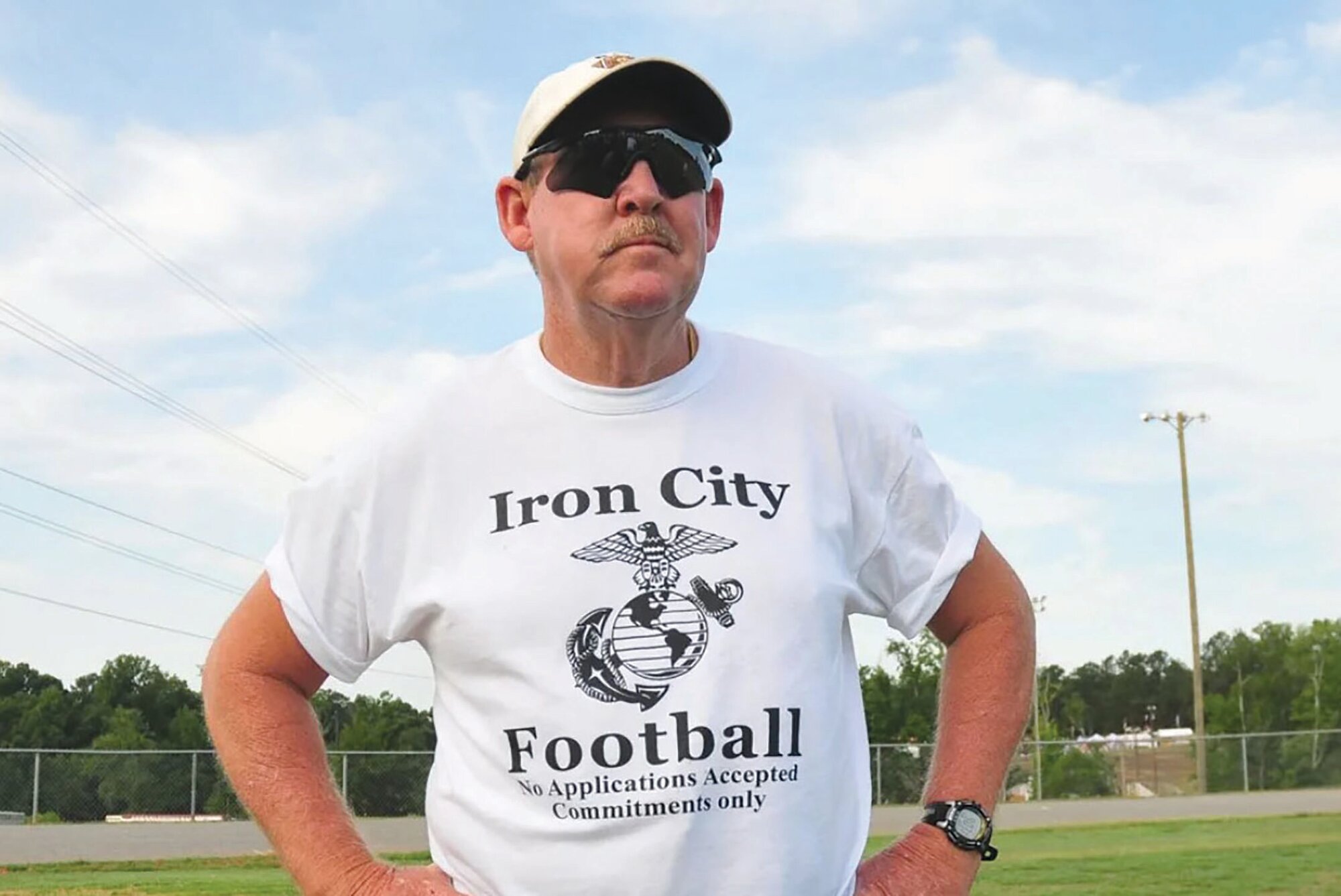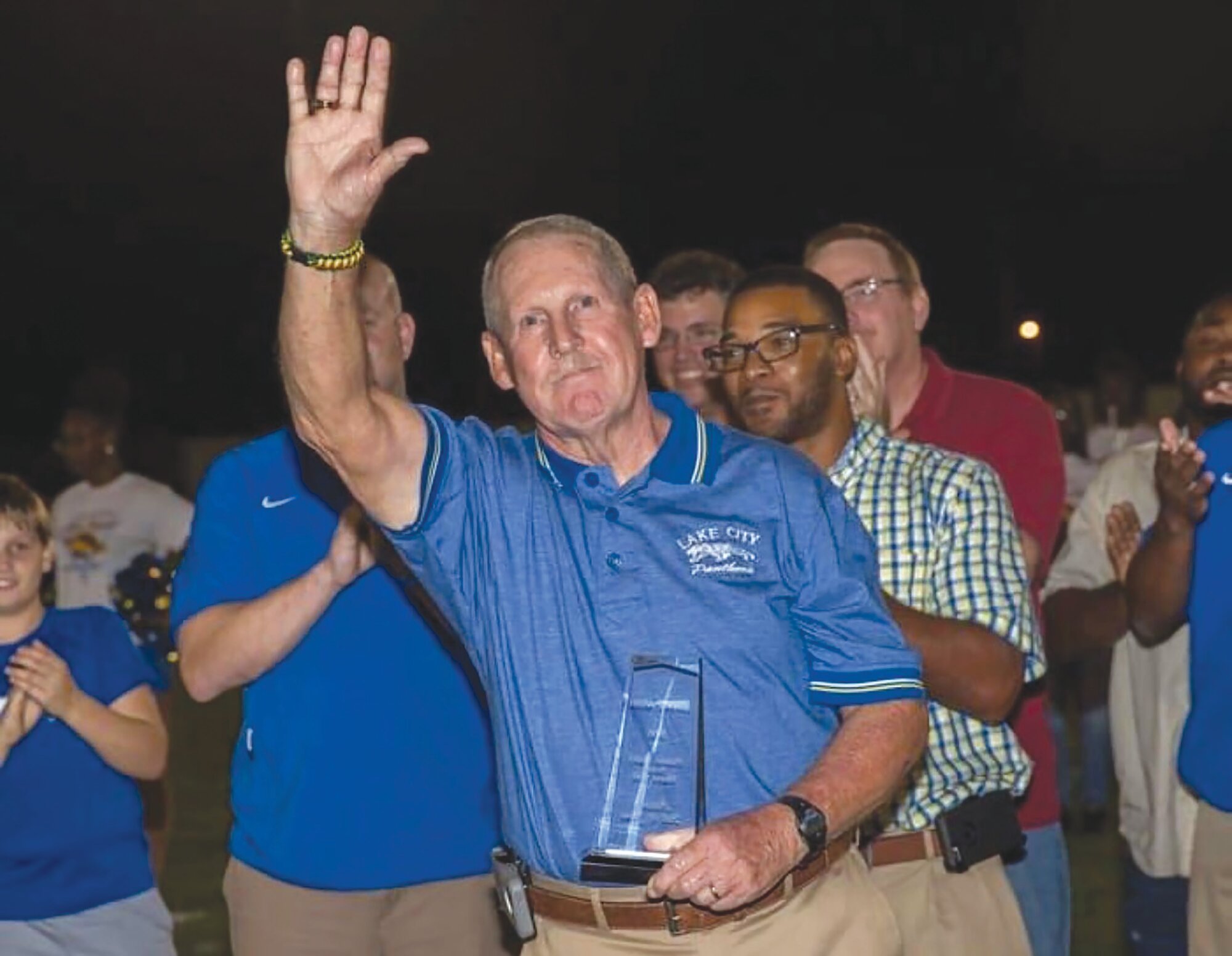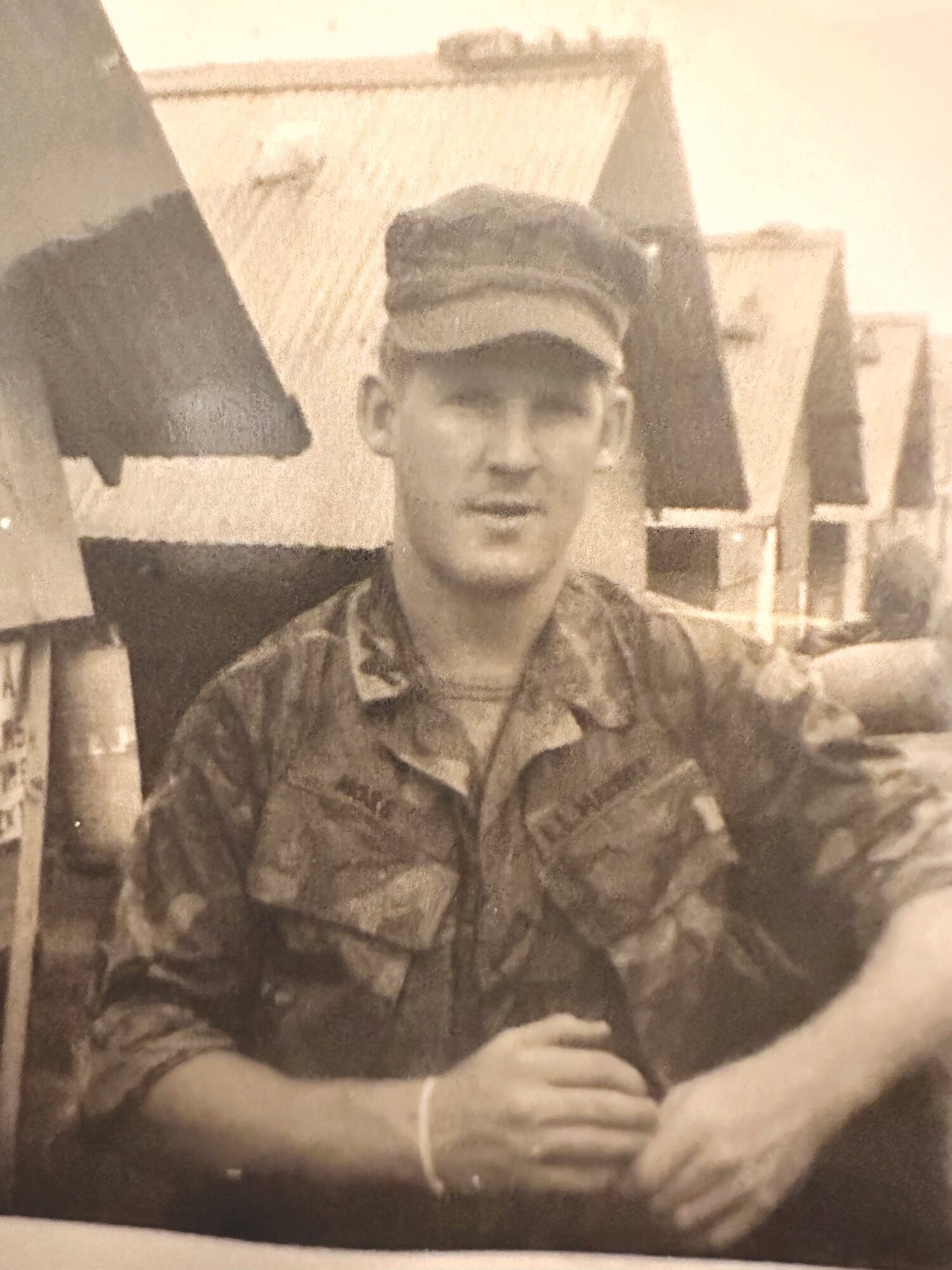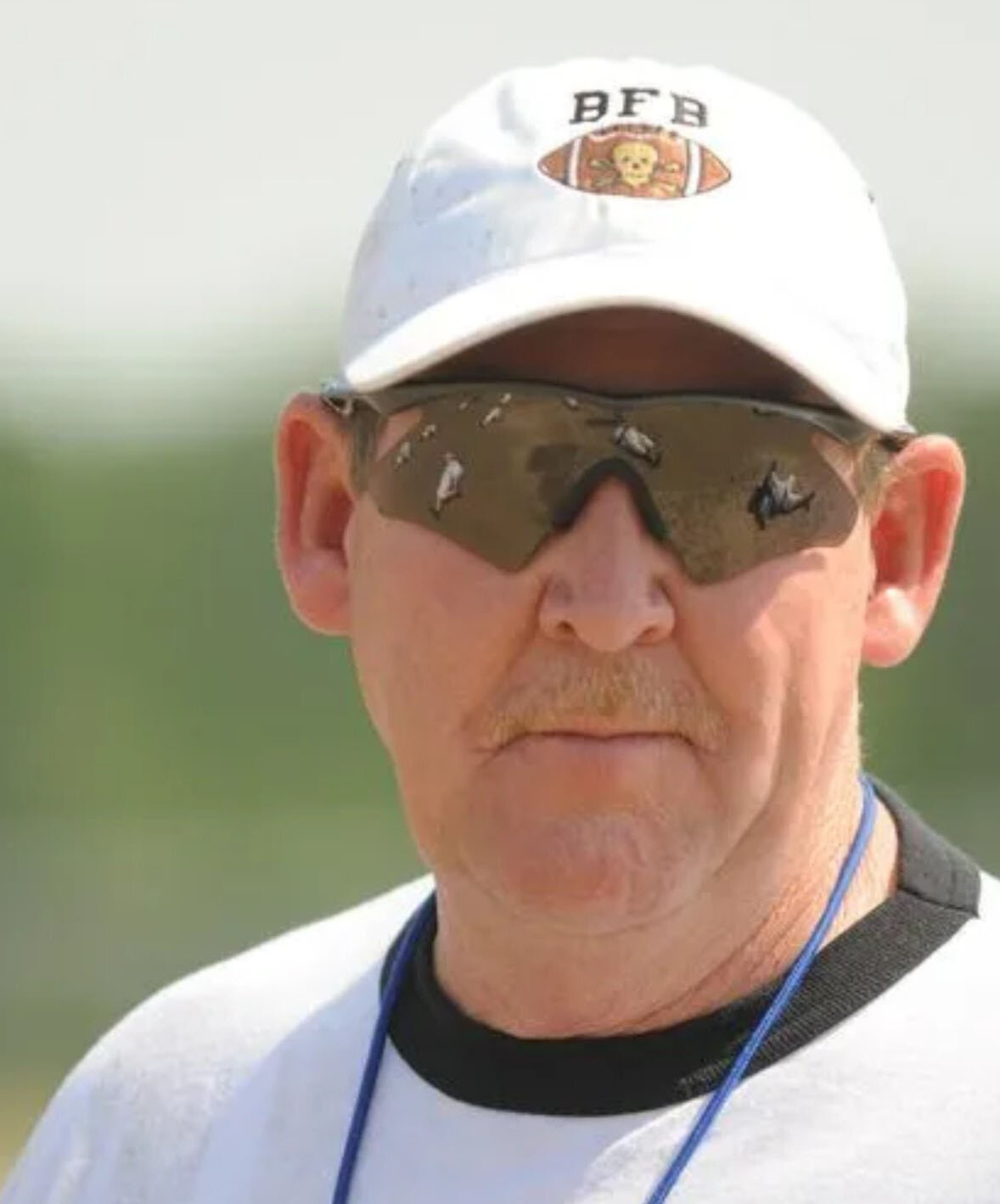Former players, coaches reflect on career of late Mickey Moss as the former EC, Lake City coach adds another Hall to his historic resume
tim@theitem.com
In many ways, Mickey Moss was the perfect example of a high school football coach.
Mickey's coaching career spanned five decades, starting as an assistant in Willston-Elko before closing his career at his alma mater, Blacksburg. In between, he became a local icon, leading East Clarendon to a state title in 1985. After a stop in Saluda, he came back to the Pee Dee to coach at Lake City for 13 years. Mickey gave several local coaches their start with the Panthers, including his son, Mike, who now serves as the defensive line coach at Sumter High, Manning head coach Reggie Kennedy and a chunk of the current coaching staff at Lake City, including their offensive coordinator, Ed Brogdon, and their athletic director and head baseball coach, Matt Apicella.
Across his career, Mickey was able to find the balance between the role of strict leader - in part because of his military background after serving in the Vietnam War with the Marine Corps - and loving father figure for every player he coached in both football and baseball.
Away from the gridiron, Mickey was both an athletic director and a critical figure in the South Carolina Athletic Coaches Association, serving as the organization's president in 2001 before joining its Hall of Fame in 2014. Mickey was a mentor to many until he passed away in April at 74.
Mickey was no stranger to Hall of Fames, as he earned the honor at both East Clarendon and Florence County. This fall, it was announced that he would join yet another. The South Carolina Football Coaches Association announced he would be part of its 2024 class.
SUCCESS IN TURBEVILLE
Brogdon played quarterback for Mickey at East Clarendon, helping the program go undefeated in 1985 on their way to a state championship. Brogdon felt the way many Wolverines did during the '80s. Mickey made them feel loved, even if there was a tinge of fear of the Purple Heart-earning coach.
"He always had your back. It was a safe place," Brogdon said. "Even though we weren't aware of it then, he had a place for us. We had fun, even though we worked hard. He got everything out of us because we wanted to make sure that we did not disappoint him. He made that environment for you to just excel."
Kennedy, who was also a member of that state championship squad before playing linebacker at South Carolina State, said the hours Mickey spent with his team on and off the field left a lasting imprint.
"During the offseason, we spent so much time together down in the locker room doing stuff after school with him, and I just think the man he was away from the field just made us accept the discipline he gave us with no problem," Kennedy said. "We knew he had our best interests at heart, and we knew he'd give us a tough love."
Mickey carried a certain energy into the program. He was always willing to do the dirty work, and he expected his assistant coaches and players to do the same.
"You're going to be successful; you have no choice but to be successful," Brogdon said. "It was encouragement. He would go the extra mile for you. I can remember being sick and him coming out to my house to check on me and make sure everything was OK. He was just that kind of guy."
One of the reasons East Clarendon was able to take the next step in 1985 was an expanded passing game. The Wolverines ran the ball like no one else in '84, so much so that Jimmy Fleming set a national record for touchdowns with 48. But Mickey thought his team needed another dimension, so he sent Brogdon to a quarterback camp that offseason.
Suddenly, EC could do it all, and the Wolverines ran into little resistance on their way to a state title. The defense, led by Kennedy, pitched five shutouts in the regular season and allowed just 12 points in the entire postseason. The offense, meanwhile, was unstoppable. They weren't held under 30 points in the regular season, though some rainy conditions in the playoffs kept things interesting. Their closest games were actually the three games before the state championship, a 10-0 win over Lewisville, a 12-6 win over Calhoun Falls and a 13-6 win over Great Falls.
The win over Calhoun Falls is a lasting memory for Kennedy and his teammates. The field was waterlogged, so they were forced to postpone the game a day, meaning kids from a small town like Turbeville were able to get some new experiences.
"We remember riding the charter bus going down to Calhoun Falls," Kennedy said. "We got the opportunity to stay in a hotel in Greenwood. That's something that, I'm coming from Gable and the guys from Turbeville and New Zion, we didn't know how it felt to stay in a nice hotel and take a charter bus."
But the core memory from that championship run came in the locker room before kickoff, when Mickey fired up his team ahead of a 33-6 rout of Timmonsville.
"I still remember the pregame speech for the state championship game," Kennedy said. "We talked about kamikaze pilots, and one of his best friends came in the locker room with him, and he body slammed his best friend on the concrete floor during his speech getting ready for the state championship."
All of the theatrics aside, Mickey had something that every great coach needs.
"He earned the trust of the parents. Whatever Coach Moss said was gold," Kennedy said. "He learned that over the years, years of showing that he cared about us away from the field. He'd bring us home, and if he had to come in and talk to your parents, he'd do that also. He just earned the trust of the community."
LIFTING YOUNG COACHES
Those relationships Mickey built with his players bore fruit throughout the intervening decades. He was able to help jump start the careers of so many coaches. When Kennedy graduated from S.C. State, his first job was for Mickey at Lake City.
"I think just the love and affection he showed us and how we learn how to love other people by playing under him, I think that kind of led us to the profession," Kennedy said.
Brogdon followed in Mickey's footsteps in more ways than one. Just like his head coach, Brogdon joined the Marines before following him into the coaching ranks. He was far from the only one.
"From the Cook boys (Scott and Jason) to Seneca Baron, Reggie Kennedy, all of those guys, we just see him as that guy that kind of showed us the way of how to be successful, how to do things the right way, how to lead people, how to be a leader and not be a follower," Brogdon said. "That's what I get through most of the guys that came up through him and under him."
Kennedy thought Mickey was the perfect coach to introduce newcomers to the profession.
"I wish every young assistant coach could work under him. He brings in a military style of coaching. You wouldn't be late for one of his meetings," Kennedy said with a laugh. "He brought structure and he brought discipline to the coaches and players. That was real big for me as an assistant coach. I just wondered why are we doing this and why we had to be here at this time. Once I became a head coach, I see why now. He's just been a blessing to me. He helped my career so much when I became a head coach, and then I went back and tried to do things he did with players and coaches."
But Mickey didn't just elevate his former players through the ranks. Matt Apicella came to Lake City right after graduating from Ohio State thanks to an education job fair. One day, Mickey pulled Apicella into his office and started his coaching journey.
"I sat down in his office, and he said, 'I'm just going to tell you right now, I don't care what you know or what you think you know because I'm going to teach you everything that you need to know. But if you're ever disloyal to me, this school or these kids, I'll fire your blankity-blank on the spot,'" Apicella said. "And I said 'yes sir,' and that was it."
Apicella's coaching journey didn't start the way he expected. Mickey didn't put him right on his coaching staff for football or baseball; Apicella had to earn that.
"He told me if I wanted to coach football that I had to start somewhere," he recalled. "He told me, 'You're gonna be the girls assistant soccer coach.' And I said, 'Coach, I've never played soccer in my life; I don't know anything about it.' He said, 'Well, you're going to learn how to deal with kids before you work with me.'"
Mickey was Apicella's "Dad in the South," and he taught the future Lake City AD and head baseball coach so many important lessons.
"No. 1 is loyalty. Loyalty to the kids, the programs and the other coaches. He always said when you have to make a decision, if you always do right by the kids, you'll be fine," Apicella said. "You were never going to outwork the old man, no matter how hard you tried. If you showed up an hour early, he was already there. He used to tell us, 'By the time I tell you what needs to be done, if you're not doing it already, it's too late.' So, we learned to look forward.
"Just to listen to the former players talk about Coach Moss, everybody was scared of him, coaches, kids, everybody. But it was kind of like a father's discipline. Not an actual fear but a fear of respect. You never wanted to let him down. That's what resonates through all the old stories."
Eventually, Mickey left Lake City to coach at Wren and tried to bring Apicella along with him. While Apicella declined, their bond only grew after Mickey left the Panthers.
"I still have dozens of voicemails that I transferred from phone to phone just because I don't want to get rid of them," Apicella said. "Hilarious voicemails talking about if the Buckeyes lost or he talked about Urban Meyer and Jim Tressel or he'd call and give me motivation, congratulate me on big wins in baseball. He always touched base, and I always called him for advice. The relationship got stronger once he left and as I grew in the profession."
Scott Earley was another young coach who got his start at Lake City. Before moving to South Carolina, Earley was in Kings Mountain, North Carolina. The principal at his high school, John Goforth, was a Blacksburg native, just like Mickey. So when Earley was interested in moving to S.C., Goforth made the connection. The pair met one day in Blacksburg, and Mickey offered him a job as an assistant for football and baseball.
"It was in Lake City, South Carolina, so I wasn't quite sure that needed to be the stop," Earley admitted, as his sights were more firmly set on Myrtle Beach. "That was on a Saturday, and on Monday, we get up and there's two contracts in the mailbox, one for her (his wife), one for me to come to Lake City. We felt like he was either a Vietnam directive or a sign from God, so we headed to Lake City."
"He said, 'If you come to Lake City and help me straighten out the baseball program and coach football for me on the defense side of the ball, if you want to go to Horry County, if you do what you're supposed to do for me, I'll put you in Horry County.' And the rest is history, man."
That history is an equally impressive coaching career for Earley. After his stint in Lake City, he made his way to Myrtle Beach, winning a state title in 2008. He then went to a pair of Lexington County schools before his final coaching stop, a great run at Westside that began in 2014. He stepped away from coaching in 2022 to take over as the executive director of the South Carolina Athletic Coaches Association. He gives Mickey credit for involving him in the program.
"He's my mentor, he's a great husband, a great father, a Vietnam veteran and an even better person. He basically steered and shifted my entire career even to the point of becoming the executive director of the South Carolina Athletic Coaches Association," he said. "I became the youngest president in SCACA history just because when I came to him at that young age, he insisted that I go to the meetings, go to clinic, run for a district office seat, run for a board seat, and he did that with all of his guys. He created a lot of diversity and leadership in this state by just not taking no for answer."
Earley saw firsthand the way Mickey connected with his players, while also pushing them to become the best version of themselves. The same could be said for the coaches he worked with.
"He had the unique ability to encourage and share wisdom and knowledge and discipline, but at the same time love you and pat you on the back and see the potential in you," Earley said. "We used to call it taking in stray dogs, and his (coaching) tree is so extensive. I think all of us off his tree had that same pride in not only helping student-athletes, but helping young coaches become coordinators and head coaches and principals and ADs and have families and children. He and (his wife) Cathy were always a great example of that. Their home was always open, no matter if you were in trouble or you just wanted to say hello."
LIKE FATHER, LIKE SON
Of course, the coach Mickey influenced the most was his own flesh and blood.
Mike Moss grew up inundated with high school athletics. He was a middle-schooler when East Clarendon was dominating SCHSL 1A.
"Dad and I, we were always together," Mike said. "I've often thought that there's not too many football fields or basketball gyms or baseball fields in the state of South Carolina that I haven't been to.
"It was a very formative time of my life where I was being exposed to a lot of different things and being around a lot of great guys. Those teams at East Clarendon, he had some of the best young men, some of the hardest-working young men that kinda shaped me and molded me."
As Mike was inching toward high school, Mickey took a job at Saluda. Once he got there, Mike became a standout player on both his football and baseball teams.
"At the time, I didn't think it was a lot of fun," Mike said of playing for his father. "He was very tough on me. He felt like I had to be the example. He didn't let me by with anything. There were several days where I had extra duty after practice because of a screwup at practice. I've been benched several times for making the wrong decisions on the field. I didn't particularly appreciate it at the time, but as I've grown, I realized that was the best thing that he could have done for me."
Mike still remembers getting benched by his dad after striking out with the bases loaded.
"He meets me before I get back into the dugout, and he said, 'Good job. You think you can do that again?' And I was kind of a smart mouth, being that young. I said, 'Yeah, I probably could,'" Mike recalled. "And he said, 'Well, you're not gonna get the opportunity. Go have a seat for a bit.'
"It took me a while to figure that one out, but I did. I wouldn't trade it for anything, having that experience. That shaped me."
Mickey set the mold for the type of coach Mike wanted to be one day. He now coaches both football and softball at Sumter High and is known for relating with his players. It was one of the most important lessons he took from his dad.
"He was sharp as a tack with X's and O's, but he realized that it was more than that," Mike said. "If a kid knows that you'll go to the end of the world for him, they'll lay it on the line for you on the field. That's who he was. Talking to a lot of guys who played for him, playing for him myself, he was always there, always visible, always the voice, so to speak. In my coaching career, I've tried to pattern myself after that, just building those relationships and caring about kids."
Mickey also taught his son the importance of hard work. He had a humble upbringing as the son of a mechanic and a mill worker. Mickey certainly couldn't shy away from hard work in the Marine Corps. As a coach, Mickey and his assistants got their hands dirty, quite literally.
"He taught me how to work," Mike said. "I started out lining fields, cutting fields, cleaning locker rooms, just duties that nobody as a starter wants to do anymore. He always insisted that his assistants, himself included, take care of all the menial work. That's kind of what molded me, cleaning urinals, cleaning bathrooms, doing those things that are almost unthought of nowadays, but that's how he started every one of us as coaches."
When Mickey passed, Mike felt an outpouring of love from across South Carolina. When they held his memorial services at Blacksburg, Mike got a reminder of just how integral his father was in the lives of so many.
"It's only in times like that you really think about what he meant to so many different people," Mike said. "He was from a different breed of coaches. Those coaches, they were men, and they all had a tight bond. And it was great to see them all during that time when he passed. As a son, it was very important to me, at his services, to make sure that he was recognized in the right way. It was certainly nice to see everybody at that time."
More Articles to Read








